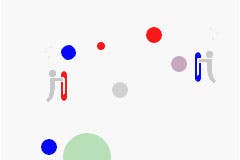Boundish
bit Generations: Pong, variations.
Released in July and exclusive, for now, to Japan, the 'bit Generations' Game Boy Advance games are simple game concepts offered at budget prices. After dotstream, here's Boundish.
It's possible to go "too big" when writing about games. You may find it interesting when talking about Phantasy Star, for instance, to note that the 'ph' spelling isn't just the Japanese being a bit pompous: 'phantasy' is actually derived from the French word, which is generally associated with imagination, while the more popular 'fantasy', which eventually eradicated it from common usage, actually came from the Greek spelling and had more to do with caprice and whimsy. You may find that interesting, see, but no one else cares. Similarly, no one would be interested in the etymology of 'Boundish', or my adventures in trying to uncover whether it's a portmanteau thing about hopping while tossing plates. NO ONE CARES TOM. WRITE THE REVIEW.
But sometimes it's better to go too big than to go too small, which would be, in this case, to reach for the old truism about cynical Publishing Men taking an old game and scrubbing it up a bit. Yes, alright, this one is basically five variations on Pong wrapped in a GBA cart with a multiplayer mode thrown in. Want a fight about it? I do.
Boundish probably comes a bit too close to exposing the core of the bit Generations - that it started off with a couple of developers doodling at lunchtime and then pooling their minimalism. Of the five ideas here, two are fairly clever, one's pretentious, one's more fun to write about than to play, and one's the sort of thing Flash-based web-games left behind five years ago. Still, it'd be wrong to assume that cynicism bore their conception and compilation; I'm convinced the cynicism came later. Small point, big difference. And now I'll write the review.
Where Boundish is good, it's because it isn't just about scoring points by moving a paddle around and whacking a little pixellated 'ball' past the other guy. The two best examples of this are the 'Power Slider' and 'Wild Go Round' variants.

The former takes place on a court shaped like a pair of overlapping circles, like the outline of a big, thickly drawn number '8' placed on its side. Your little paddle moves around the left side of the left circle, while your opponent's moves around the right of the right. But what makes the back and forward compelling isn't the distinctive movement options, but the way that the ball bounces in the middle of the play area between you, and in doing so reacts to any spin that's been applied to it. By moving the paddle sharply across the arriving ball, you can spin it as though slicing across it with a tennis racket, and the faster it's spinning the more acute the angle it'll pick up when it bounces. With a little white line across the top of the ball to help you gauge the effect, the requirements in a competitive game are as much quick thoughts as quick reactions.
Wild Go Round, meanwhile, goes one further; it's Pong played on top of an LP. Each player can move his paddle around the circumference of the circle, and must take it in turns to strike the ball and keep it in play. So if you accidentally take your opponent's turn, you then have to rush to the other side and take yours. Adding to the chaos is the way that you and your opponent's movement actually spins the surface of the record, which is in contact with the ball and muddles its path from one side to the other. In other words, strike the ball and then move and you can wobble its trajectory, confusing the other player. Maddeningly difficult to figure out, this activity also has an effect on the blippy little soundtrack, which trembles and reverses as the disc rotates.
But where those games are good, others are less so. 'Human League' is the pretentious one, I reckon - a sort of Pong-while-doing-Cat's-Cradle. You have two paddles on each side, and control them both with the standard up-and-down of the d-pad. But each paddle is suspended in the air by four grey lines, and the relationship between the paddles and their manoeuvrability is beholden to these lines; move one to an extreme, and it'll be harder to move the other quickly. You can also move the paddle nearest the centre in and out from the line that divides the two sides of the court. Frankly, it's all a bit much for me. I could admire the other two games, but I've barely figured this one out and some of the above is guesswork, which came about as I sat endlessly not having fun with it.

Getting worse then, there's 'Pool Flower'. As each round unfolds, circles of varying sizes float onto the screen and waft through the background. If you strike them with the ball, they adopt your colour and buzz off to the other player's side of the screen, where they impede his movement. And while he can convert them to his colour, he'll have to bounce the ball off them first to do so, which can be fatal. For your part, the passage of the ball after it leaves your paddle will be speeded by contact with any circles that share your colour scheme. It's practically a strategy game, as you spend more time trying to marshal circular troops with your strokes than you do trying to put the ball beyond your opponent. But on the other hand, every round begins the same way, and losing because you got your feet caught is more irritating than the concept's worth.
That, finally, leaves 'Box Juggling', and this is the least impressive of the lot, and nothing like Pong. It is what it says. You control a little stick-man waddling left and right along the bottom of the screen, and have to position him under a falling box. Hit it with his left or right arm and it springs up to the top of the screen and descends again but - oh no! - if it hits him on the head, he'll be frozen for a few vital seconds. The idea is to get a high score. The challenge comes from the occasional falling evil purple boxes (hiss!), the addition of extra boxes to juggle, and your frustration and impatience leading you to use the A button - the serpent's apple of Box Juggling. Hit A while positioned under a falling box and you'll use your hands to thrust it upward, high above the roof of the screen. This being a single-screened GBA, not a DS game, you won't see where it goes up-top; you'll just have to wait for it to come back down again. You can't be sure where it'll land either, and although you get more points for doing the big upward thrusts than you do for small-scale juggling, it's difficult to say it's worth it. On the whole, this is a case of simple concept, neat execution, but they forgot to bring the fun.
Given the inclusion of multiplayer, Boundish could - for the scant few who'll ever come to play it this way - amount to quite a worthy and interesting purchase. But without other players it's nothing close to that - three difficulty levels for each of the five variations mean it can be challenging, but the hooks here are mostly conceptual. It's like that special bike they wheeled out at your school fete, where the handlebar input was reversed, and you had to try and override your unconscious instinct and actually turn in the direction you were toppling whenever you started losing your balance. The two things aren't so dissimilar. Interesting concepts, but not exactly premiere leisure time activities - and I dare say if the bike had the same problems with controls that Boundish has (the LP variant, in particular, longs for an analogue stick, with the d-pad an awkward substitute), it wouldn't even make it to the fete.
There are specks of inspiration, then, but on the whole Boundish isn't a complete enough concept to justify an entire game. Unlike dotstream, to use the one we've already talked about, Boundish really does feel like a few bits left over; like it ought to be the bonus bit of something else. It may be variations on Pong, but maybe the greater sin is that it's more Greek fantasy than French.
So anyway, that's how to go "too big".
Boundish is one of seven 'bit Generations' titles released for Game Boy Advance in Japan at a budget price. Nintendo has yet to announce any plans for the games in the West, but each is perfectly playable thanks to English menuing.

